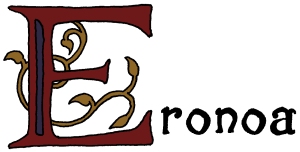2. Eronoa

All knowledge regarding the universe before the existence of the world, and the process of its creation, come from what Eronoa told a gathering of faeries in the year -2122. This audience took place in the city of Vyurel, and the gathering consisted of six hundred twelve elves, one thousand two hundred fifteen pixies, two hundred seventy four nymphs, eight hundred eleven dryads (accounting for all trees in earshot), four hundred nineteen satyrs, six hundred eighty four gnomes, nine hundred forty two sylphs, sixty three centaurs, fifty seven cat people, twenty four naiads, thirteen spriggans, and some five hundred unclassified and miscellaneous faeries. These witnesses were known as the Erojinni. The audience itself was an event referred to as Eronoa’s Divulgence.
The goddess was later described by Erojinni as appearing to be an exceptionally beautiful, but otherwise ordinary, elf woman, just slightly taller than average, with flowing black hair to her waist and perpetually flushed, light brown skin. Her hips were wide, her breasts large, and her features were generally voluptuous, with protruding lips and round cheeks.
It was never discovered whether or not this was her true form. It was probably not her only form, as, by her own account, her body bore several features before the creation of the world that were not apparent to the Vyurel faeries, most notably her size, which must have been many times greater in her time with Lakual.
Later, it would generally be held that Eronoa was quite candid in this audience with the faeries, as there was something self-deprecating about her description of her own apathy. One Erojinni, an elf man named Reimo Parsying, described the event in one of his memoirs;
She looked like a beautiful elf maiden, yet she seemed to glow somehow, in some manner that could not be seen in the way one usually means the word--there was no question she was a goddess, or at least something beyond all of our conceptions of what was possible.
As she spoke, I slowly became aware of a fervency in her manner and tone. At first she had seemed merely to be standing still, smiling vaguely, and coldly relating these details to us which felt queerly . . . personal. And then I realised that her voice was not as monotonous as it had first seemed to me; there was a very subtle, persistent quaver. It was as though she didn't know what she was going to tell us next;
"I used to know Lakual's body very well, you see, but now it was so strange. I almost had to take it apart because I--almost like I needed to do something like that to wake myself up." Her eyes widened and she grinned--but there was something submissive about her grin, as though she was showing us her teeth so--well, so, I suppose, we could knock her teeth out if we wanted to. I don't know why I should choose such words to describe it, but they do describe it well . . . despite the fact that I and everyone else present to whom I've spoken felt a complete and almost inexplicable love for her. Perhaps we pitied her? No, surely not.
"I couldn't seem to care very much about anything," she continued. "Well, there was nothing then, really. Just him, or what was left of him. I couldn't care about him. But now I have . . . all of you. Do you think . . . I'm wicked?" It was as though she really wanted us to tell her she was good. Needless to say, not one of us had the audacity to claim such knowledge of the goddess's essential nature. Several of us simply cried, "No!" But none of us knew. None of us know now.
Eronoa stayed among the faeries of Vyurel for eight days. During this time, she coupled with five elf men, one elf woman, three nymphs, and a gnome man. These sexual partners of the goddess were known as the Erosum. Most of them died in the twenty following years, having taken their own lives, unable to bear the absence of the goddess.
The eight days when Eronoa resided in Vyurel was a period referred to as the Days of Original Bliss, as Eronoa inspired a sense of absolute peace in all who looked upon her. It has never been discovered by any faerie society whether or not, after the Days of Original Bliss, Eronoa had manifested on Wethepahn again. Some believe she committed suicide long ago, while others claim that the wild and bloody course of history was in itself evidence of Eronoa’s continued existence and continued effort to alleviate her perennial apathy.

